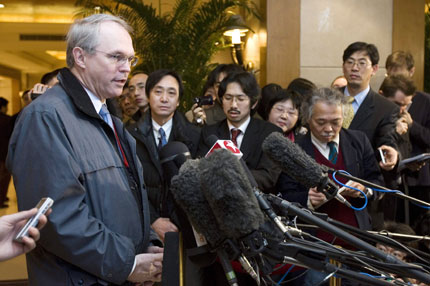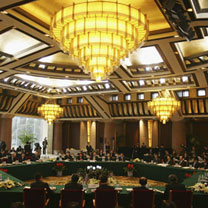Asia-Pacific
US, North Korea caution on hope for nuclear deal
(Reuters)
Updated: 2007-02-09 17:24
 |
Large Medium Small |
But both North Korea and the United States warned against reading too much into the first day of talks and "counting chickens before they hatch".
A diplomatic source close to the six-party talks said the draft prepared by China stated that North Korea would "suspend, shut down and seal" nuclear facilities at the Yongbyon plant within about two months in return for energy and economic aid.
The fresh momentum in the talks between the two Koreas, China, the United States, Japan and Russia came after the US and North Korean negotiators held path-breaking two-way talks in Berlin last month.
The Berlin meeting cooled tension that had boiled after Pyongyang staged its first nuclear test blast last October and the United Nations responded with sanctions.
Envoys to the talks voiced hope that North Korea was now ready to restrict its nuclear ambitions after over three years of stop-start negotiations.
"There is a realisation that the first step we're looking at is a big first step, so to some extent it's going to require a little bit of a jump for them," the chief US negotiator, Assistant Secretary of State Christopher Hill, told reporters after meeting the North Korean delegation.
Echoing a comment by US Secretary of State Condoleezza Rice on Thursday, he said: "I think we can be cautiously optimistic but don't want to count our chickens before they hatch".
Chief North Korean delegate Kim Kye-gwan said his team had been "able to reach agreement on some issues" with Washington.
"There are still differences on a series of issues in the overall talks, so we will try to work them out," he told reporters. "You should not try to count the chickens before they hatch, as somebody said."
North Korea is under intense pressure to accept a deal.
Pyongyang's tight-lipped diplomats have not publicly spelled out their price for accepting a shutdown of Yongbyon, which produces plutonium that can be refined for nuclear weapons.
But a Tokyo-based newspaper close to North Korea suggested that the wary?North Korea?also wants Washington to prove its goodwill.
"North Korea's position is that it will take corresponding measures if the early steps can demonstrate that the United States' abandonment of a hostile policy is irreversible," the Choson Sinbo said.
NOTE OF CAUTION
In Beijing, Japan's chief negotiator, Kenichiro Sasae, said the six sides still had much ground to cover.
"It's too early to discuss whether the draft agreement is acceptable as each country is to present its ideas and I believe China has its own ideas," Sasae told reporters.
The diplomatic source in Beijing said that the draft agreement did not yet contain "clear reference to verification processes" in the initial-phase. "There is much room for discussions and adjustments," the source said.
In September 2005, negotiators agreed on a joint statement -- a sketch map of the nuclear disarmament steps Pyongyang needed to take to secure fuel and economic aid, as well as political acceptance from its longtime adversary, the United States.
But that deal languished after the United States said in late 2005 that North Korea was laundering income from counterfeiting US currency and other illicit business, prompting a crackdown on a Macau bank that drew angry protests from Pyongyang.
Washington and Pyongyang finance officials have been tackling the bank dispute in separate talks, though it is unclear how they have progressed. North Korea had said there could be no progress on nuclear issues until the financial stand-off was resolved.
| 分享按鈕 |



